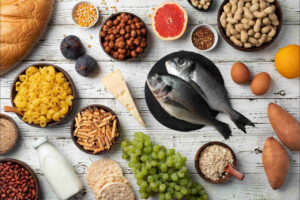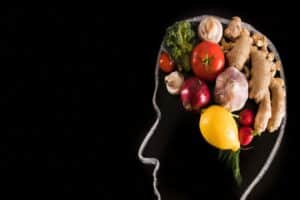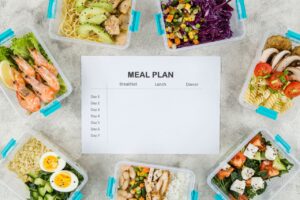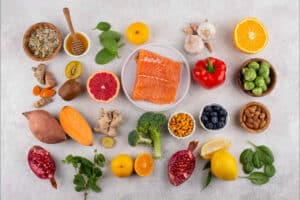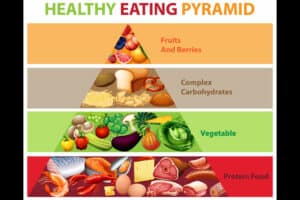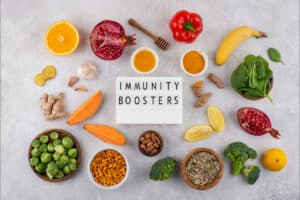Table of Contents
In today’s fast-paced lives, finding the right balance between shedding extra pounds and maintaining consistent energy levels is vital. That’s where “Nutrient-rich foods for weight loss and sustained energy” come into play. These powerhouse foods are effective for weight loss and sustain our energy levels throughout the day.
In this article, we’ll delve into the world of these foods and uncover their secrets. Understanding their operations can be your key to a healthier, more energetic life.
So, join us as we explore the science behind nutrient-rich foods, bridging the gap between weight loss and sustained energy. Get ready for a journey that promises a leaner you and a livelier, more vibrant lifestyle.
Understanding Nutrient-Rich Foods
Regarding weight loss, not all calories are created equal. Nutrient-rich foods stand out as nutritional powerhouses, offering many essential elements beyond simple energy.
Let’s explore nutrient-rich foods and their pivotal role in promoting weight loss.
What are Nutrient-Rich Foods?
Nutrient-rich foods provide a high concentration of vitamins, minerals, antioxidants, fiber, and other essential nutrients relative to their calorie content. Unlike empty-calorie options, such as sugary snacks and refined grains, nutrient-rich foods offer many health benefits beyond fueling the body.
The Role in Promoting Weight Loss
- Satiety and Reduced Caloric Intake:
- Nutrient-rich foods, rich in fiber and protein, give a feeling of fullness.
- This satiety effect can reduce overall caloric intake, aiding in weight loss.
- Metabolism Boost:
- Certain nutrients, like B vitamins and iron, affect metabolic processes.
- Adequate nutrient intake can support a more efficient metabolism, potentially assisting in weight management.
Essential Nutrients and Their Benefits
Now, let’s explore the various types of essential nutrients and their specific benefits for the body:
1. Vitamins
- Vitamin A:
- Supports vision, skin health, and immune function.
- Found in carrots, sweet potatoes, spinach, and kale.
- Vitamin C:
- Boosts immune function and aids in collagen production.
- Abundant in citrus fruits, strawberries, and bell peppers.
2. Minerals
- Calcium:
- Crucial for bone health and muscle function.
- Found in dairy products, leafy greens, and fortified foods.
- Iron:
- Essential for oxygen transport in the blood.
- Sources include lean meats, beans, and fortified cereals.
3. Proteins
- Complete Proteins:
- It is found in animal products and certain plant sources like quinoa and soy.
- Support muscle repair and overall body function.
- Essential Amino Acids:
- Obtained through a variety of protein sources.
- Contribute to various bodily functions, including neurotransmitter production.
4. Fiber
- Soluble Fiber:
- Found in oats, beans, and fruits.
- Aids in cholesterol regulation and provides a feeling of fullness.
- Insoluble Fiber:
- Abundant in whole grains and vegetables.
- Supports digestive health and regular bowel movements.
Benefits Summarized in a Table:
| Nutrient | Benefits | Food Sources |
| Vitamin A | Vision, Skin Health, Immune Support | Carrots, Sweet Potatoes, Spinach, Kale |
| Vitamin C | Immune Support, Collagen Production | Citrus Fruits, Strawberries, Bell Peppers |
| Calcium | Bone Health, Muscle Function | Dairy Products, Leafy Greens, Fortified Foods |
| Iron | Oxygen Transport in Blood | Lean Meats, Beans, Fortified Cereals |
| Proteins | Muscle Repair, Overall Body Function | Animal Products, Quinoa, Soy |
| Soluble Fiber | Cholesterol Regulation, Satiety | Oats, Beans, Fruits |
| Insoluble Fiber | Digestive Health, Regular Bowel Movements | Whole Grains, Vegetables |
Understanding the diverse benefits of these essential nutrients is fundamental to making informed choices in your journey toward weight loss and improved well-being.
Next, we’ll explore the concept of nutrient density and its link to weight loss.
The Link Between Nutrient Density and Weight Loss
Understanding nutrient density is critical to making informed dietary choices that support weight loss. In this section, we will explore the concept of nutrient density and its profound connection to effective weight management.
Nutrient Density Demystified
Nutrient density refers to the concentration of essential nutrients relative to the calorie content in a given food. In other words, it’s about getting the most nutritional bang for your caloric buck. Nutrient-dense foods provide a high amount of vitamins, minerals, and other beneficial compounds without excess calories.
The Advantages of Nutrient-Dense Foods for Weight Loss
- More Satiety, Fewer Calories:
- Nutrient-dense foods like leafy greens, lean proteins, and whole grains are rich in fiber and protein.
- They contribute to a feeling of fullness, helping you consume fewer calories.
- Balanced Nutrition:
- Nutrient-dense foods offer a wide array of essential nutrients.
- This promotes overall health while supporting weight loss, as the body receives the necessary tools for optimal function.
- Long-Term Sustenance:
- Unlike empty-calorie foods that provide a temporary energy boost, nutrient-dense options supply sustained energy.
- This sustained energy can help you maintain an active lifestyle, further aiding in weight management.
Identifying Nutrient-Dense Foods
1. Vegetables and Fruits
- Dark Leafy Greens:
- Spinach, kale, and Swiss chard are rich in vitamins A, C, and K, as well as minerals like iron and calcium.
- Colorful Fruits:
- Berries, oranges, and apples offer a variety of antioxidants and vitamins.
2. Lean Proteins
- Poultry and Fish:
- Chicken, turkey, and fish are excellent protein sources, essential for muscle maintenance and repair.
- Plant-Based Proteins:
- Lentils, beans, and tofu provide protein along with fiber and various nutrients.
3. Whole Grains
- Quinoa and Brown Rice:
- These whole grains are rich in fiber, B vitamins, and minerals.
- Oats:
- Oats offer soluble fiber, promoting heart health and satiety.
Nutrient Density in Practice
Let’s put nutrient density into action by creating a sample meal that exemplifies this concept:
Nutrient-Dense Meal Example
- Grilled Salmon Salad:
- Salmon provides omega-3 fatty acids and high-quality protein.
- The salad includes dark leafy greens, colorful bell peppers, and cherry tomatoes for various vitamins and antioxidants.
- Quinoa and Vegetable Stir-Fry:
- Quinoa serves as a nutrient-dense base, accompanied by a medley of colorful vegetables.
- Tofu adds plant-based protein, rounding out the nutritional profile.
By understanding and embracing nutrient density, you can make choices that contribute to weight loss and foster overall health and vitality.
The following section will explore the essential nutrients in the weight loss journey.
Essential Nutrients for Weight Loss
In the journey towards effective weight loss, specific nutrients support the body’s functions and promote a healthy metabolism.
This section will explore the importance of these critical nutrients and the foods that are rich sources of them.
1. Fiber: The Satiety Champion
Fiber is an unsung hero in the quest for weight loss. It not only aids in digestion but also promotes a feeling of fullness, reducing overall caloric intake.
Foods High in Fiber:
- Legumes:
- Beans, lentils, and chickpeas are rich in fiber and protein.
- Whole Grains:
- Brown rice, quinoa, and oats provide both soluble and insoluble fiber.
- Vegetables:
- Broccoli, Brussels sprouts, and carrots are excellent sources of fiber.
2. Protein: The Muscle Sustainer
Protein is a cornerstone in the weight loss journey. It helps maintain muscle mass, supports metabolism, and contributes to a sense of fullness.
Protein-Rich Foods:
- Lean Meats:
- Chicken, turkey, and lean cuts of beef are high-quality protein sources.
- Fish:
- Salmon, tuna, and other fatty fish offer protein and beneficial omega-3 fatty acids.
- Plant-Based Proteins:
- Tofu, lentils, and edamame provide protein for those on a plant-based diet.
3. Healthy Fats: The Energy Source
Not all fats are detrimental to weight loss. Healthy fats, such as monounsaturated and polyunsaturated fats, are essential for overall well-being and can contribute to satisfaction.
Sources of Healthy Fats:
- Avocado:
- Rich in monounsaturated fats and fiber, avocados offer a satisfying addition to meals.
- Nuts and Seeds:
- Almonds, chia seeds, and flaxseeds provide healthy fats, fiber, and essential nutrients.
- Olive Oil:
- Extra virgin olive oil is a heart-healthy source of monounsaturated fats.
4. Complex Carbohydrates: The Energy Sustainer
While reducing overall carbohydrate intake may be a strategy for some, incorporating complex carbohydrates is essential for sustained energy levels, especially for those leading an active lifestyle.
Complex Carbohydrate Sources:
- Sweet Potatoes:
- Packed with vitamins and fiber, sweet potatoes are a nutritious carbohydrate choice.
- Quinoa:
- A complete protein and whole grain, quinoa offers sustained energy.
- Legumes:
- In addition to fiber and protein, legumes provide complex carbohydrates for long-lasting energy.
Crafting a Nutrient-Rich Meal for Weight Loss
Combine these essential nutrients to create a balanced, nutrient-rich meal that supports your weight loss goals:
Grilled Chicken and Vegetable Quinoa Bowl:
- Grilled chicken breast for lean protein.
- Quinoa for complex carbohydrates and complete protein.
- Colorful vegetables like bell peppers and spinach are good for fiber and vitamins.
Understanding the importance of these critical nutrients and incorporating them into your diet can foster a supportive environment for weight loss while ensuring your body receives the essential elements it needs.
Sustained Energy through Nutrient-Rich Foods
Maintaining consistent energy levels is paramount in pursuing a balanced and sustainable approach to weight loss. This section will explore how nutrient-rich foods contribute to sustained energy throughout the day, providing the vitality needed for an active and fulfilling lifestyle.
The Role of Nutrient-Rich Foods in Energy Levels
- Balanced Macronutrients:
- Nutrient-rich foods often contain a balance of macronutrients – proteins, carbohydrates, and fats.
- This balance ensures a steady release of energy, preventing the spikes and crashes associated with highly processed, sugary foods.
- Slow-Release Carbohydrates:
- Complex carbohydrates in whole grains, legumes, and vegetables release glucose gradually.
- This steady release of energy helps maintain blood sugar levels and sustains vitality throughout the day.
Nutrient-Rich Foods for Sustained Energy
1. Nuts and Seeds
- Almonds:
- Packed with healthy fats, protein, and fiber, almonds provide a sustained energy boost.
- Chia Seeds:
- High in omega-3 fatty acids, fiber, and protein, chia seeds offer long-lasting energy.
2. Fruits
- Bananas:
- A natural source of sugars, fiber, and potassium, bananas provide quick energy and sustained fuel.
- Berries:
- Rich in antioxidants and fiber, berries offer a steady energy release without causing blood sugar spikes.
3. Greek Yogurt
- Protein-Rich Yogurt:
- Greek yogurt is high in protein, promoting satiety and sustained energy.
- Addition of Berries:
- Combining yogurt with berries enhances the nutrient content and sustains energy.
Practical Tips for Maintaining Energy Levels
- Balanced Meals:
- Incorporate a combination of lean proteins, complex carbohydrates, and healthy fats into each meal.
- Regular Snacking:
- Choose nutrient-dense snacks between meals to maintain energy levels without overloading on calories.
- Hydration:
- Stay hydrated throughout the day, as dehydration can lead to fatigue.
Crafting an Energy-Boosting Snack
Greek Yogurt Parfait with Mixed Berries:
- Greek yogurt for protein.
- Mixed berries for antioxidants and natural sugars.
- A sprinkle of almonds or chia seeds for healthy fats and additional nutrients.
By embracing nutrient-rich foods that promote sustained energy, you support your weight loss goals and enhance your overall well-being. In the final sections, we’ll guide you through building a nutrient-rich weight-loss meal plan and address common challenges associated with this transformative journey.
Building a Nutrient-Rich Meal Plan for Weight Loss
Crafting a well-rounded and sustainable meal plan is pivotal for successful weight loss. This section will provide you with a sample meal plan incorporating nutrient-rich foods to support your journey toward achieving and maintaining a healthy weight.
Sample Nutrient-Rich Meal Plan
Day 1:
Breakfast:
- Quinoa Breakfast Bowl:
- Quinoa with almond milk.
- Topped with fresh berries, sliced bananas, and a sprinkle of chia seeds.
Lunch:
- Grilled Chicken Salad:
- Mixed greens with grilled chicken breast.
- Cherry tomatoes, cucumber, and a drizzle of olive oil as dressing.
Snack:
- Greek Yogurt Parfait:
- Greek yogurt with mixed berries and a handful of almonds.
Dinner:
- Salmon and Vegetable Stir-Fry:
- Salmon with a variety of colorful vegetables.
- Served over a bed of brown rice.
Day 2:
Breakfast:
- Oatmeal with Nut Butter:
- Oats cooked in water or almond milk.
- Topped with a spoonful of almond or peanut butter.
Lunch:
- Quinoa and Black Bean Bowl:
- Quinoa mixed with black beans, corn, and avocado.
- Sprinkled with cilantro and a squeeze of lime.
Snack:
- Hummus and Vegetable Sticks:
- Carrot and cucumber sticks with hummus for a satisfying and nutrient-rich snack.
Dinner:
- Vegetarian Lentil Soup:
- Hearty lentil soup with a variety of vegetables.
- Whole-grain roll on the side.
General Guidelines for Building Your Meal Plan:
- Incorporate a Variety of Colors:
- Aim to include a colorful array of fruits and vegetables to ensure a diverse range of nutrients.
- Balance Macronutrients:
- Each meal should balance protein, complex carbohydrates, and healthy fats.
- Stay Hydrated:
- Water is essential for overall health and can also help control appetite.
- Mindful Portions:
- Be mindful of portion sizes to avoid overeating, even with nutrient-dense foods.
This sample meal plan provides a template for a day of nutrient-rich eating, but feel free to adapt it to suit your preferences and dietary requirements.
Overcoming Common Challenges
While the benefits of incorporating nutrient-rich foods into your diet are substantial, facing challenges on the journey toward weight loss is not uncommon. In this section, we’ll address common obstacles and provide practical solutions to help you overcome them.
1. Time Constraints:
Challenge:
- Busy schedules can make it challenging to prepare nutrient-dense meals.
Solution:
- Meal Prep: Dedicate a specific weekly time to plan and prepare meals in advance.
- Batch Cooking: Cook in batches and freeze portions for quick and convenient meals.
2. Budget Constraints:
Challenge:
- A perception that nutrient-rich foods are expensive.
Solution:
- Buy in Bulk: Purchase staples like whole grains, legumes, and frozen vegetables in bulk to save money.
- Seasonal and Local: Opt for seasonal and locally sourced produce, which can be more affordable.
3. Taste Preferences:
Challenge:
- Resistance to the taste of certain nutrient-dense foods.
Solution:
- Experiment with Cooking Techniques: Try different cooking methods to enhance flavors.
- Add Herbs and Spices: Incorporate herbs and spices to add flavor without extra calories.
4. Social and Cultural Influences:
Challenge:
- Social occasions or cultural practices may involve less healthy food choices.
Solution:
- Plan Ahead: Bring a nutrient-rich dish to social gatherings.
- Make Informed Choices: Opt for healthier options when dining out.
5. Cravings for Unhealthy Foods:
Challenge:
- Persistent cravings for less nutritious, high-calorie foods.
Solution:
- Moderation: Allow yourself occasional indulgences in moderation.
- Find Healthy Alternatives: Identify nutrient-dense alternatives to satisfy cravings.
6. Lack of Support:
Challenge:
- Limited encouragement or support from friends or family.
Solution:
- Communicate Your Goals: Communicate your goals to those around you.
- Seek Supportive Communities: Join online or local communities with similar health goals.
Conclusion:
Overcoming these challenges requires planning, adaptation, and a positive mindset. By proactively addressing these obstacles, you’ll be better equipped to stay on track with your weight loss journey while enjoying the numerous benefits that nutrient-rich foods bring to your overall health.
In conclusion, the path to weight loss and sustained energy through nutrient-rich foods is challenging. Still, with determination and strategic planning, you can create a balanced, enjoyable lifestyle that aligns with your health goals. Remember, each small step towards incorporating nutrient-rich choices contributes to your long-term well-being.
FAQs
Q: Can I achieve weight loss by simply focusing on nutrient-rich foods, or is exercise equally important?
A: While a balanced diet rich in nutrients is crucial for weight loss, incorporating regular physical activity is also essential. Exercise not only aids in burning calories but also contributes to overall health and well-being.
Q: How can I ensure I’m getting enough nutrients on a plant-based or vegetarian diet for effective weight loss?
A: Plant-based and vegetarian diets can be nutrient-dense. Ensure a variety of fruits, vegetables, legumes, nuts, and whole grains to cover essential nutrients. Consider consulting a nutritionist to tailor your diet to meet individual needs.
Q: Are there specific nutrient-rich foods that can help with managing cravings and preventing overeating?
A: Yes, certain foods can help manage cravings. High-fibre options like fruits, vegetables, and whole grains contribute to a feeling of fullness. Protein-rich foods, healthy fats, and mindful eating practices also aid in controlling appetite.
Q: How can I incorporate nutrient-rich foods into my diet without spending a lot of time on meal preparation?
A: Meal prepping and batch cooking are efficient strategies. Plan simple, balanced meals, and consider using frozen or pre-cut vegetables for convenience. Quick and nutritious options like salads, smoothies, and one-pan meals can be time-saving.
Q: Can nutrient-rich foods contribute to sustained energy levels throughout the day, and how can I avoid energy crashes?
A: Yes, nutrient-dense foods can provide sustained energy. Focus on balanced meals with a mix of proteins, complex carbohydrates, and healthy fats. Avoid excessive refined sugars and prioritize whole foods to help stabilize blood sugar levels and prevent energy crashes.






